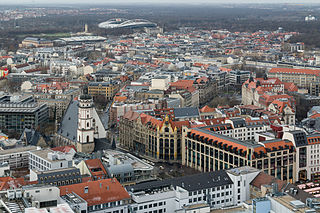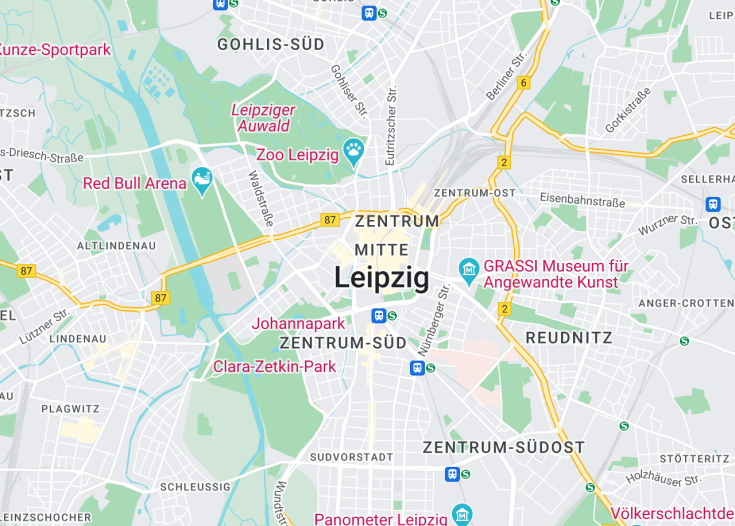Leipzig, a dynamic city in the heart of Germany, is renowned for its vibrant arts scene, compelling history, and modern urban vibe. A major cultural hub, it boasts a rich musical heritage, being home to famous composers like Johann Sebastian Bach and Felix Mendelssohn. Leipzig’s architectural marvels reflect its storied past, ranging from Renaissance buildings to monumental post-war structures. The city is a beacon of creativity, known for its annual events that attract global audiences, including the reputable Leipzig Book Fair and the engaging Wave-Gotik-Treffen music festival.
For an enriching experience, explore the St. Thomas Church where Johann Sebastian Bach once served as a cantor and immerse yourself in its melodious history.
Plan your visit to coincide with Leipzig’s diverse cultural festivals to witness the city’s bustling artistic community and vibrant cultural expressions firsthand.
Top things to do & see in Leipzig
Select the following sights and activities to discover best tickets and tours available in Leipzig.
Leipzig: A Blend of Historical Richness and Modern Vibrancy
| Country | Germany |
| Time in Leipzig | GMT+1 |
| Language spoken | German |
| Population | 605,407 (source: Leipzig City Administration, 2023) |
| Currency | Euro (€, EUR) |
| Airports |
|
Leipzig, located in the federal state of Saxony, Germany, harmoniously combines historical depth with dynamic modern life. Known for its pivotal role in European history, particularly during the Renaissance and the Reformation, Leipzig also shines in music and culture, having been home to legendary composers like Bach and Mendelssohn. Today, it stands out as a cultural hub, hosting one of the oldest universities in Europe, the University of Leipzig, established in 1409. The city’s rich historical tapestry is evident in its architecture, seen in the stunning buildings such as the St. Thomas Church and the Old City Hall.
Not merely resting on its historical laurels, Leipzig is also a city looking to the future. It has developed into an important economic center, fostering innovation across various sectors including automotive manufacturing, publishing, and technology. The Leipzig Trade Fair, one of the world’s oldest trade fairs, continually attracts global businesses, boosting local and international trade relations.
Leipzig’s revitalization efforts have transformed old industrial spaces into vibrant cultural venues. The Spinnerei, formerly a cotton mill, now houses art galleries, studios, and exhibition spaces. Meanwhile, its music scene, rooted deep in its history, still thrives in venues like the Gewandhaus and the Opera Leipzig, offering classical and contemporary performances that draw both locals and tourists alike.
Nature lovers also find refuge in Leipzig’s extensive parks and waterways, perfect for leisurely walks or boat rides. The city’s commitment to environmental sustainability is evident in these well-maintained green spaces.
With a lifestyle that smoothly integrates the hustle of city life with the calm of suburban and rural charms, Leipzig remains a desirable destination for many. Its ability to embrace the new while respecting tradition makes it uniquely positioned as not just a travel destination but also a place to live.
Where is Leipzig?
Leipzig is situated in eastern Germany, nestled amidst the Saxon Lowlands, approximately 150 kilometers south of Berlin.
Distances:
| Route | Distance by car | Time by car |
|---|---|---|
| Berlin to Leipzig | 118 miles (190 km) | Approx. 2 hours |
| Dresden to Leipzig | 70 miles (113 km) | Approx. 1.5 hours |
| Munich to Leipzig | 230 miles (370 km) | Approx. 3.5 hours |
What is Leipzig famous for?
Leipzig is renowned as a city of music and books, having been the home of famous composers such as Bach and a center for significant historical events, including the Monday demonstrations leading to the fall of the Berlin Wall.
History
Before 1000: Early Settlements
The area of Leipzig, in the fertile basin of the river Pleisse, White Elster, and Parthe, has a history of human settlement that dates back to at least the 5th century BC. The region was originally inhabited by Slavic tribes, who were eventually absorbed or displaced by the incoming Germanic groups during the early Middle Ages.
1165-1700: Foundation and Growth
Leipzig was officially founded in 1165 when Emperor Barbarossa granted the settlement city privileges and market rights. This paved the way for it to become a significant trade center. Leipzig’s location at the intersection of the Via Regia and Via Imperii, two major medieval trade routes, significantly contributed to its development. The city experienced substantial growth due to trade fairs, becoming a major European center of commerce and culture.
1701-1900: Cultural and Intellectual Hub
Through the 18th and 19th centuries, Leipzig emerged as a cultural and intellectual hub. It housed one of Germany’s oldest universities, the University of Leipzig, founded in 1409, and became prominent in the publishing industry. The city saw considerable contributions from notable figures such as Johann Wolfgang von Goethe and Johann Sebastian Bach, who worked here as a cantor and musical director at the St. Thomas Church.
1901-Present: Modern Developments and Reunification
Leipzig played a pivotal role in the lead-up to the fall of the Berlin Wall in 1989. Known as the Monday Demonstrations, these peaceful protests were significant in the peaceful revolution that led to German reunification. Post-reunification, Leipzig has transformed considerably, experiencing significant investment, restoration of historic buildings, and growth in the creative and technology sectors. Furthermore, the city has become an important trade fair location once again, building on its historical reputation.
Visit Leipzig
What to see and do in Leipzig
Leipzig is a city rich with cultural, historic, and modern attractions. A visit may include:
- The Gewandhaus Concert Hall, home to the famous Gewandhaus Orchestra.
- The historic Auerbach’s Keller, famously frequented by Goethe and mentioned in his work “Faust”.
- Leipzig Zoo, one of the oldest zoos in the world and known for its large variety of species and unique enclosures like Gondwanaland.
- The St. Thomas Church, where Johann Sebastian Bach worked and now rests.
- The Monument to the Battle of the Nations, commemorating the 1813 Battle of Leipzig with its impressive architecture.
Additionally, exploration of the city’s vibrant arts scene at the Spinnerei, a former cotton mill turned art complex, is a must.
Noteworthy Events in Leipzig
Leipzig hosts a variety of cultural and musical events throughout the year. The Leipzig Book Fair in March is a significant event for book lovers and professionals. The Bach Festival in June celebrates the city’s musical legacy, attracting enthusiasts from around the world. For something unique, the Wave-Gotik-Treffen, the world’s largest gothic festival held annually at Pentecost, offers an extraordinary experience with concerts, cultural events, and more.
Best time to visit Leipzig
The best time to visit Leipzig is during spring (April to June) when the weather is mild, and the city’s parks and gardens are in bloom. Fall (September to October) is also pleasant, offering vibrant foliage and comfortable temperatures, ideal for exploring outdoor sights.
Is Leipzig worth visiting?
Leipzig is undoubtedly worth visiting. The city offers a rich mix of historical significance, cultural depth, and modern vibrancy. It’s a place where history intersects with contemporary life, evident in its architecture, festivals, and educational institutions. Whether you are a history buff, art lover, or music enthusiast, Leipzig provides a diverse range of activities and experiences that cater to all interests, making it a must-visit destination in Germany.










